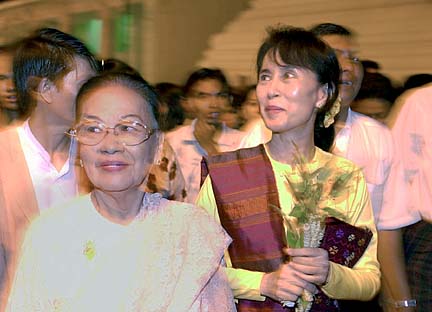


The Rising East

|
Aung San Suu Kyi
sees freedom at lastIf ever there was a profile in courage, surely it must belong to Aung San Suu Kyi, the gentle but iron-willed woman who personifies Burma's hopes for democracy and a decent life.
During the last dozen years, Suu Kyi has been threatened, confined, hounded and cursed by the military junta that rules the Southeast Asian nation also known as Myanmar. She has faced down soldiers with rifles aimed at her, outlasted police who trapped her several times for several days in a car, and borne the pain of being denied a farewell visit with her dying husband.
She has refused to surrender despite having been in and out of house arrest all these years. Suu Kyi (pronounced Sue Chee) was released again this week after long negotiations with the autocratic State Law and Order Restoration Council, or SLORC. Just how much freedom she will have remains unclear.
A decade ago, Suu Kyi expressed her thoughts on cour-age: "Fearlessness may be a gift but perhaps more precious is the courage acquired through endeavor, courage that comes from cultivating the habit of refusing to let fear dictate one's actions, courage that could be described as 'grace under pressure' -- grace which is renewed repeatedly in the face of harsh, unremitting pressure."
Suu Kyi is among a handful of strong women who have risen to prominence in Asian nations commanded by men for centuries. They include former President Corazon Aquino of the Philippines, President Megawati Sukarnoputri of Indonesia and opposition leader Wan Azizah Wan Ismail in Malaysia.
Two rivals dominate politics in Bangladesh: Prime Minister Hasina Wajed and former Prime Minister Khaleda Zia. President Chandrika Kumaratunga of Sri Lanka and two former prime ministers, Sonia Gandhi of India and Benazir Bhutto of Pakistan, are members of this sisterhood.
These are not women who have risen through the ranks. Rather, they are daughters, wives or widows of powerful men, all but two of whom met violent deaths. They are not, however, mere surrogates for departed fathers or jailed husbands, for they have steely ambitions of their own.
Suu Kyi had no intention of becoming a political leader. Educated at Oxford, married to an English scholar, Michael Aris, and mother of two sons, she returned to Burma in March 1988 to care for her gravely ill mother. On Aug. 8, an uprising known as 8-8-88 erupted and she got caught up in the movement toward democracy in her impoverished nation.
A month later, the National League for Democracy, or NLD, was formed with Suu Kyi as general secretary. Her mother died that December and the funeral turned into a large, peaceful protest. While campaigning for the NLD in April 1989, Suu Kyi was targeted by army riflemen; a last-minute countermand spared her.
Then, in July, Suu Kyi was placed under house arrest. Even so, her NLD won 82 percent of the seats in the parliamentary elections of May 1990. The SLORC, however, refused to accept the results and sought her return to her family in England "on humanitarian grounds." She defied them.
When her husband learned that he was dying of cancer in 1998, the junta indicated that she could go to England -- but not return to Burma. They also denied her husband a visa to see her. She refused to give up the struggle. He passed away in 1999.
Over the years, Suu Kyi has generated remarkable international support. She has been awarded the Sakharov prize by the European Parliament, the Nobel Peace Prize and other honors in a dozen countries. She was awarded the Presidential Medal of Freedom, America's highest civilian honor, in 2000.
People who have met Suu Kyi say she walks into a room with elegance and grace, almost always wearing fragrant jasmine flowers in her hair. A slight woman of 5 feet, 4 inches and maybe 100 pounds, she speaks softly but persuasively.
She clearly reveres her father, Gen. Aung San, who was instrumental in obtaining Burma's freedom from Britain in 1947. But she never really knew him because he was assassinated by political rivals seven months after independence, when she was 2 years old.
In her essay on courage, she wrote of her father's courage, "the kind that enabled him to speak the truth, to stand by his word ... to respect the opposition, to parley with the enemy, and to let people be the judge of his worthiness as a leader. It is for such moral courage that he will always beloved and respected in Burma."
With her own courage, Aung San Suu Kyi is her father's own daughter.
Richard Halloran is a former correspondent
for The New York Times in Asia and a former editorial
director of the Star-Bulletin. His column appears Sundays.
He can be reached by e-mail at rhalloran@starbulletin.com